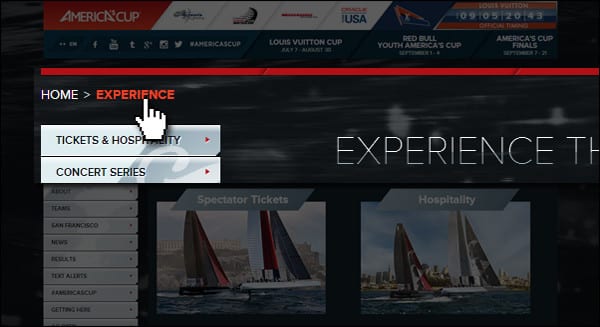
The busy venue owner may not be aware of how powerful the word "experience" can be - as it pertains to tickets sales. From the ticket buying public's point of view, it is an event's experience that has the most value. This post looks at the use of the word "experience" in conjunction with (and possibly in lieu of) the "buy tickets!" call to action on an event website.
Selling the America's Cup experience
The annual sailing competition known as the America's Cup race was first held in 1851 off the coast of Wight in England and was won by the schooner America. This year's race is being held off the coast of San Francisco with more than one-hundred thousand spectators attending the event. The America's Cup website is the single source for event tickets and there is a noteworthy ticket sales tool being used.
As seen in the hero image above, the word "experience" is a first-class citizen in conveying the value to the would-be ticket buyer. The word "tickets" is prominent, but note how the first order of business is allowing the buyer to choose an experience - then tickets become the focus. The website navigation has raised the word "experience" to be level with the impulsive "TICKETS" button. After arriving at the website experience section, the buyer is presented with a quadrant of choices, each one tailored to a certain sub-class of customers. The website visitor makes their choice and follows the "story" of each available experience, culminating in a "buy tickets" button.
Telling the story of an event experience - before making much mention of buying tickets - is a new trend more and more venues have put into place. Here's why...
Selling experiences vs. selling tickets
https://www.youtube.com/watch?v=Zr1s_B0zqX0
Apple advertising shows the experience, and barely shows the product at all!
Anyone in the business of selling event tickets should take the time to consider the America' Cup website and how the experience is the primary selling point. Much has been written about the psychology behind selling experiences in the context of retail consumer products:
When consumers see the product, the tangible benefits of it will naturally emerge in consumers’ mind. The tangible benefits are simply the usage of the product. What’s cool is that the experiential marketing can make consumers catch the intangible benefits of the product. Intangible benefits may refer to the symbolic meaning of the product, the feeling of fantasy or excitement, sensory stimulation and etc. (Youn-Kyung Kim, 2001). Hence, when facing with experiencing marketing, consumers are receiving more product information than they are facing normal marketing and this results in better sales.
The intangible benefits from selling the experience apply directly to event tickets as do the increased sales - just ask America's Cup.
Some venue owners and event managers may balk at the idea of selling an experience because they consider their event too small, or not intended for the wealthy sailboat racing crowd. Going back to the retail example of selling experience, remember that Walmart is actively selling the "experience" to its demographic - one that is far removed from the yacht racing demographic.
Walmart national TV campaigns depict hard working folks in the store and speaking to equally hard working Walmart employees. The Walmart experience is one of value and consumer choice. The Walmart TV ads of just a few years ago were static images of products and the price, no shoppers in store, no employees being helpful. After telling the "story" of the in-store experience, only then will one see a product price (if at all).
Time spent reviewing how your website presents the experience. Is the word "experience used in conjunction with the "buy tickets!" call to action? What is the path you are asking your would-be customers to take? Does it start with a quadrant of experiences divided by commitment (time and cost), or does it hardly mention the experience at all?
In the (justifiable) rush to generate revenue, one may be overly focused on instructing the website visitor to jump to the buy tickets section without regard to conveying the value of the experience, or better yet, the experiences (plural) available for purchase. It doesn't matter the size of an event, or its economic demographic. Being in attendance at a location with other people is an experience. The experience of attending a poetry slam at the local coffee shop is just as important as the high-end experience of the America's Cup as it relates to ticket sales.
ThunderTix - A powerful ticket sales tool
The take away is to consider a practical transition to selling multiple types of experiences first, then gracefully shepherding your customer along to the ticket purchase process. And selling both experiences and tickets is a function of your choice in ticketing software.
A great way to sell event experiences (and tickets) in the form of packages. ThunderTix season packages are complete collections of your events that you can custom configure in any combination you choose. Each package has its own ticket type, price, availability. Do you have questions about the season packages as they relate to your unique business circumstances? Contact our sales team to have all your questions answered!
